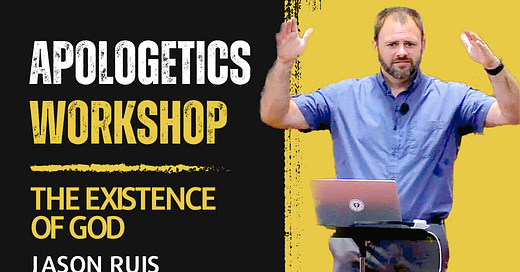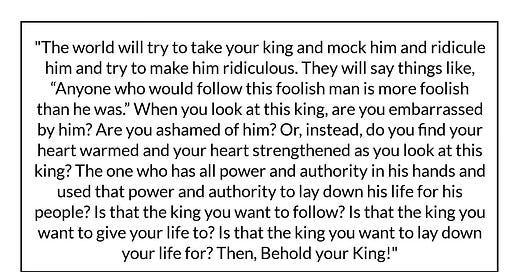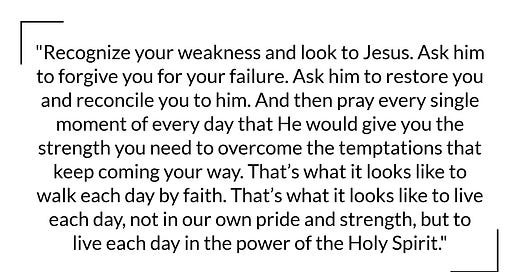
Seated At the Right Hand (Psalm 110)
Today is the beginning of Epiphany. It comes directly after the twelve days of Christmas. The beginning doesn’t always land on a Sunday, but it always starts on January 6th. When we celebrate Epiphany, we are celebrating the “revealing” or the “appearing” of who Jesus is. When we use the word epiphany in our present time, it means the same thing. An epiphany is a “light bulb” moment—a moment when things “click,” when truth is revealed or when an idea appears out of nowhere.
There are many biblical stories that are connected with this celebration. One of those stories involves the Wise Men (or Magi). When we actually slow down and think about what happened in the story of the Magi, it’s pretty incredible. A couple years after Jesus is born these men from the East follow a star so that they can worship Him. They come to King Herod and say, “Where is the one who has been born king of the Jews? We saw his star in the east and have come to worship him.” (Matthew 2:2, NIV). Isn’t it interesting that they know Him as a King already. They weren’t simply seeking a baby. They weren’t simply seeking a Messiah. They were seeking a King and the wanted to worship Him. Once they found Jesus, Matthew writes, “They saw the child with his mother Mary, and they bowed down and worshipped him. Then they opened their treasures and presented him with gifts of gold and of incense and of myrrh.” (Matthew 2:11, NIV).
In this story, Jesus is revealed as a King—it’s a “light bulb” moment for the world. After looking at our passage this morning, we will begin to understand that it shouldn’t have been such a surprise that this child would be King. It had been prophesied for centuries that it would be so. Yet, God used these Magi to open people’s eyes to the reality of who Jesus is—a King. Let’s look at our passage. [Read Psalm 110]
In this Psalm, David gets right to the point. “The LORD says to my Lord: “Sit at my right hand until I make your enemies a footstool for your feet.”” (Psalm 110:1, NIV). You should notice in your Bibles that the first LORD is different from the second Lord. The first one is in all caps and the second one looks normal. Whenever you see the word LORD in all caps, it is translating the Hebrew word for Yahweh—the name of the Father. So, this passage is giving us insight into a conversation between the Father and someone who is David’s Lord—master. The Jews always understood this “someone” to be the coming Messiah. Then, as we read through the New Testament, we see that confirmed that this is speaking about the Messiah in general—and Jesus, who is the Messiah, in particular. So, we get an inside scoop into a conversation between the Father and the Son.
What is that conversation? The Father looks at the Son and says, “Sit at my right hand…” As many of you probably know, to be seated at someone’s right hand is to be seated in a place of honor and power. The person at the right hand rules and reigns. So the Father is telling Jesus to sit at his right hand to rule and reign over all of creation. This is a picture of Jesus as King.
It’s pretty incredible isn’t it? We just wrapped up the Christmas season, focusing on and emphasizing Jesus as a baby in a humble manger—meek and mild. Now, as we look at this passage, we are given a glimpse of something more. We are given a picture of that humble, meek, and mild baby seated on a throne, ruling and reigning as King over all of creation. That’s what the Magi saw! That’s why they traveled so far. That’s why the brought gifts and fell down and worshipped Him immediately. When they saw that child, they saw the King of Creation.
Then, this passage gives us another glimpse into the conversation between the Father and the Son. It says, “The LORD has sworn and will not change his mind: “You are a priest for ever, in the order of Melchizedek.”” (Psalm 110:4, NIV). So, Jesus is not only a King, but he is also a Priest. He is a Priest-King. Now, that is highly unusual because God had set things up differently. If you were a priest, you could not be a king and if you were a king, you could not be a priest. It was a simple as that. When Saul tried to take on priestly duties, the kingdom was taken from him. He should not have done that.
However, there’s this one mysterious figure in Genesis named Melchizedek. He appears briefly on the scene. It says, “Then Melchizedek king of Salem brought out bread and wine. He was priest of God Most High, and he blessed Abram…Then Abram gave him a tenth of everything.” (Genesis 14:18–20, NIV). So, as you can see from the passage Melchizedek was a king—the king of Salem—and he was also a priest of God Most High—another way of saying the one true God. He is great enough that HE gives a blessing to Abraham and Abraham offers a tithe to HIM. That places him in a position over Abraham, which is a big deal. However, Melchizedek disappears from the scene after these three verses, yet not entirely. Melchizedek is a shadow or a figure pointing us to Christ. Some say that Melchizedek was a manifestation of Christ before his incarnation, but, for a number of reasons, I don’t think that’s the case. However, I do think he is someone pointing us forward to Jesus. Here we see someone who is greater than Father Abraham, who is also a priest-king, who is helping us to understand that one day, the TRUE Priest-King would come—Jesus.
It’s important that Jesus is more than just a king. A king simply rules and reigns. That doesn’t help people who are guilty of sin. The king’s job is to punish evil—punish sin. That’s not good news to a bunch of people who are guilty sinners. Hearing that Jesus is King only deepens our awareness of the impending punishment. However, a priest’s job is to be a mediator between God and man. A priest steps in and offers sacrifices for sin and offers prayers to God on our behalf. So, the fact that Jesus is ALSO a priest, means that he has done something about our sin. He has offered himself as the last, final sacrifice for sin so that ALL who believe in Him—trust in Him, give their lives to Him—will not receive the punishment they deserve because He bore the punishment for them—he took their place. Also, as our priest, Jesus is praying for us and allows us to enter into the very presence of the Father. Not only is there no condemnation for us who believe, but there is also no longer any separation between us and God. We have been made right with Him and can enter into his presence through Jesus Christ—our Priest-King.
As our passage informs us, Jesus—our Priest-King—is seated at the right hand of the Father, ruling and reigning over all of creation. Jesus is not simply a Priest-King who rules over the Jews, nor a Priest-King who rules over God’s people, but he is a Priest-King over every nation—all people. That’s the importance of Magi traveling from the east to worship this king—they were Gentiles. They weren’t even part of God’s people at the time. Nevertheless, God’s kingdom was at hand and the kingdom was expanding beyond the boundaries of the Jews to the rest of the world. Jesus—our Priest-King—is ruling over all people. That direct us beyond the comfort of our church community. It directs us beyond the walls of our church building. It directs us beyond the borders of our nation. Jesus is King over all people, let us proclaim that to the nations. Let us make disciples of all nations.
Yet, not all people recognize his rule. Although Jesus is seated on the throne as our Priest-King, some live in high rebellion. Some attempt to subvert his kingdom or overthrow his kingdom. That’s why the Psalm says, “Sit at my right hand until I make your enemies a footstool for your feet” and “you will rule in the midst of your enemies.” (Psalm 110:1–2, NIV). The kingdom of God is breaking into this world, but it is not fully here. There remains some who refuse to bow their knee to Jesus—our Priest-King.
That means there is a battle raging. Calvin even says David “intimates that the kingdom of Christ would never enjoy tranquility until he had conquered his numerous and formidable enemies” (299). Not only is a battle raging as Christ’s kingdom breaks into this world, but that battle will continue raging until the very last day—until Christ comes again—because He will rule in the midst of his enemies. This war is not unusual or unexpected, but is part of God’s plan.
I think this is an important reminder for all of us. There are times when we can easily become frustrated or overwhelmed. We begin to feel overwhelmed when we see many young adults walking away from the church. We get frustrated when we feel attacks against the church. We become angry as we watch our culture mock, discredit, or attack the Christian faith. Yet, this passage reminds us that this going to happen until Jesus comes again. This passage reminds us that the battle is actually part of the plan—Christ ruling in the midst of his enemies is part of the plan.
And, to take this a step further, Christ rules IN and THROUGH the church. Charles Spurgeon says, “It is in and through the church that, for the present, the power of the Messiah is known” (461). So, Christ rules in the midst of His enemies through the church. That means, the church does not have the option of saying, “The world is going to hell in a handbasket, and I’m going to watch it happen” or “The battle is going to keep raging until the end anyways, why fight?” NO. Christ is ruling and reigning through the church. We are called into battle for our King. We are called make disciples of every nation. We are called to further the kingdom of God until its leaven spreads throughout the entire batch of dough. We are called to proclaim the Word of the Lord until the earth is “filled with the knowledge of the glory of the LORD, as the waters cover the sea.” (Habakkuk 2:14, NIV). We are called to fight back and the kingdom will continue to grow. Calvin exclaims, “how astonishing was it, that though the whole world was leagued in opposition to Christ’s kingdom, it yet continued to spread and prosper” (300). It will continue to do so.
And the good news is…….Christ will WIN! That’s what the last three verses are talking about. Christ will win this war. Again Spurgeon says, “The last verses of this Psalm we understand to refer to the future victories of the Priest-King. He shall not for ever sit in waiting posture but shall come into the light to end the weary war by his own victorious presence. He will lead the final charge in person; his own right hand and his holy arm shall get unto him the victory” (463).
It doesn’t matter how bleak things may look, Jesus—our Priest-King—is still seated on His throne. It doesn’t matter what trials come our way, what attacks may come, Jesus—our Priest-King—is still seated on His throne and NOBODY can remove him from that position. Therefore, we continue to fight back. We continue to go beyond the walls of our church into the community proclaiming the message of this Priest-King. He is our King who rules and reigns and calls us to submit our lives to Him. He is also our Priest who took upon himself the punishment for our sins so that we could be forgiven and enter into the presence of God. Let us proclaim that message to the end of the earth as we pray, “Your Kingdom come, Your will be done.”








